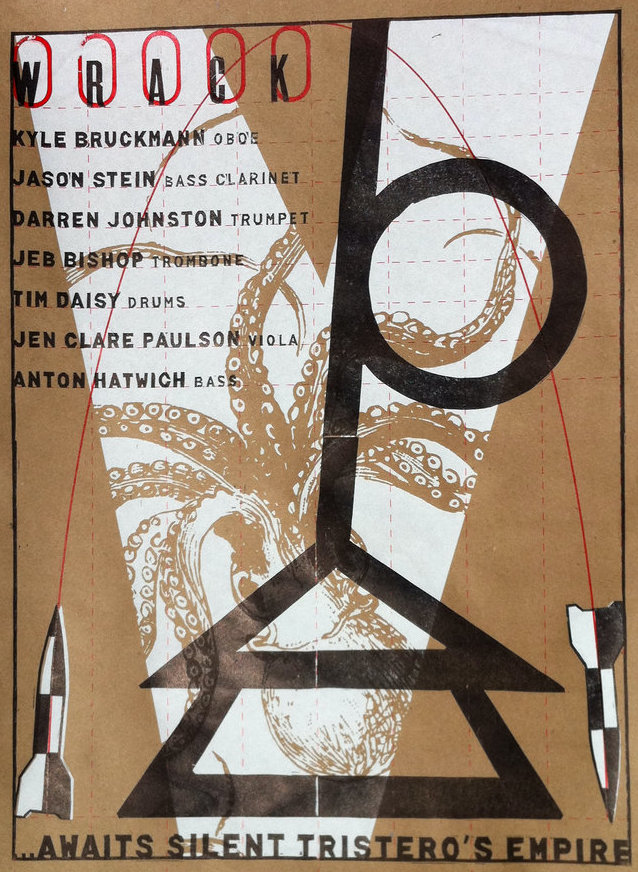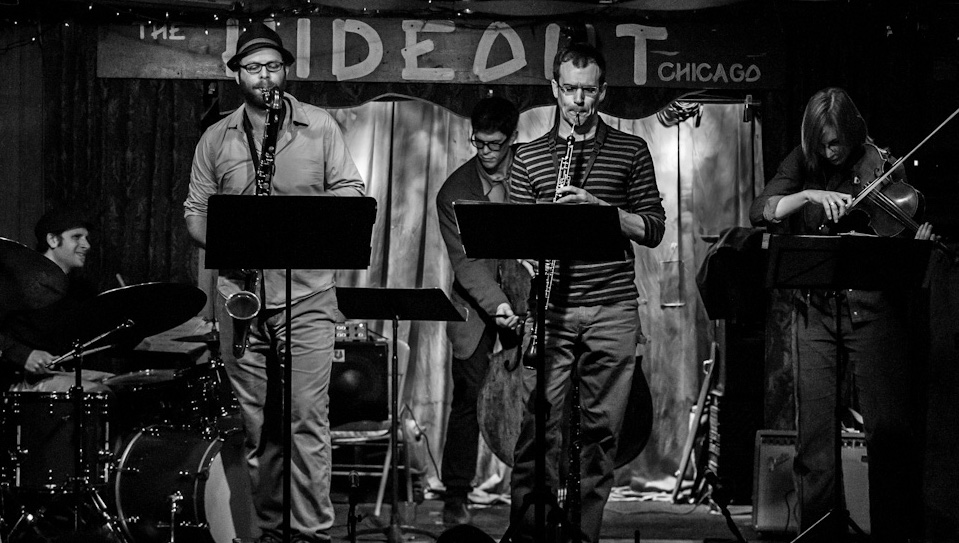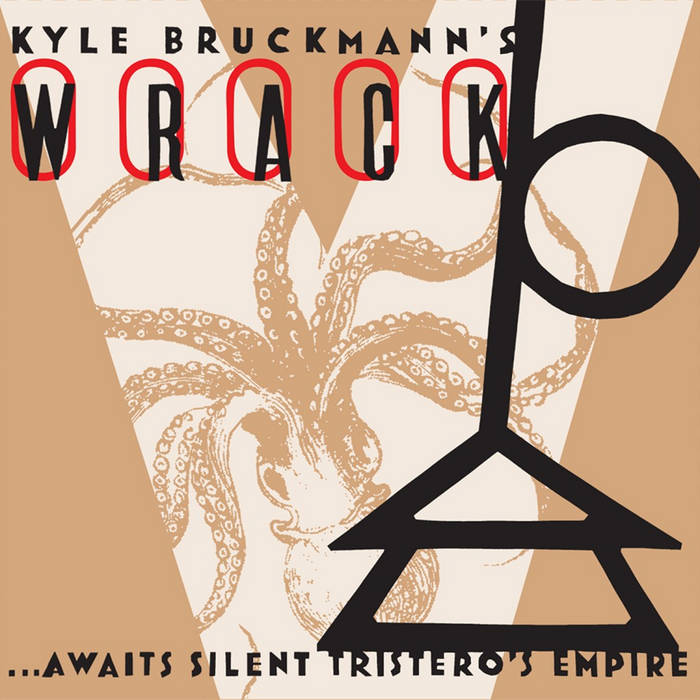Pynchon Music: Kyle Bruckmann
a cracked funhouse mirror Great American Songbook
All those long notes…what’re they up to, all that time to do something inside of? “Yardbird” Parker is finding out how he can use the notes at the higher ends of these very chords to break up the melody into have mercy what is it a fucking machine gun or something man he must be out of his mind 32nd notes demisemiquavers… the saxes downstairs getting now into some, oh some really weird shit…
—Thomas Pynchon, “Gravity’s Rainbow”
Kyle Bruckmann (b. 1971)
Pynchon Connection
Review of Kyle Bruckmann’s Wrack…Awaits Silent Tristero’s Empire
Voted best jazz/improv album of 2014 by Magnet Magazine, Awaits Silent Tristero’s Empire is a marvelous work, inventively conceived, brilliantly played, and expertly recorded. While Bruckmann provides no key to decipher which melodies were inspired by which set of Pynchon’s lyrics, it really doesn’t matter. Each piece is a whole greater than the sum of its parts, conjuring its source material with intelligence and humor. These aren’t soundtracks to the novels, but colorful distillations of their shifting plots and revolving cast of characters. The compositions also provide numerous opportunities for improvisation, with Bruckmann himself playing oboe and English horn.
The suite begins with a brief overture announced by a staggered fanfare. (To my ears, it evokes the opening theme of Leonard Roseman’s under-appreciated soundtrack to the 1978 Lord of the Rings. Not un-Pynchonian in itself!) A sawing bassline escorts us through the skittery introduction, fragmentary tunes providing glimpses into the madness to come. This “tuning up” concludes in a breathy cadenza, more sputtered than blown through a muted trumpet, a bridge that carries us directly into “V.” The longest piece in the suite, “V.” is a madcap burlesque of changing rhythms, melodies, and styles, from the cat-and-mouse striptease that opens the curtains to the boozy finale that struts off the stage. Dizzy with its own audacity, this is the musical equivalent of spinning plates—or like Bruckmann says, “juggling puppies while riding flaming unicycles through a labyrinth.” Like the best vaudeville acrobatics, everything teeters on the edge of chaos, but never quite flies off the rails. Truly wild, exciting stuff.
The Crying of Lot 49 enters quietly, the double bass exploring the terrain on curious cat-paws. Suffused with mysterious tension, the piece materializes slowly, congealing around a plaintive, longing melody played on gypsy viola. The melody strengthens as it develops, passed to the oboe and spun into a serpentine lead redolent of charmed snakes and exotic bazaars. The longest sustained theme in the suite, this sequence lasts for nine lovely minutes; but eventually the horns grow bored of “playing well with others,” and the trombone and trumpet start pulling in opposite directions. A quasi-military march erupts into to a full-throated jazz band in full beatnik mode, with staccato rhythms, a wailing bass clarinet solo, and an extended outro rolling across the drums. McClintic Sphere could hardly do better!
Gravity’s Rainbow begins not with a screaming, but a gurgling, the band trembling to life as each instrument comes into focus. What emerges from the gloom is pure showbiz, a bawdy vamp that fluoresces into something like a self-deconstructing show tune from a musical about sailors. The next section is pure Ives—One of Bruckmann’s biggest influences—as a playful bass clarinet collides headlong into a Salvation Army band. Instead of the expected fireworks, things dissolve into a protean fizzle, the viola reminiscent of John Cale’s minimalist drones. But nothing remains stable in the Zone, and soon we’re pitched back into “madcap romp” territory, whirling through chase scenes, Looney Tunes escapades, fragments of “Red River Valley,” Parkersesque bebop, jazz funerals, and vaudeville curtain calls. The most chaotic and “noisy” piece in the suite, Gravity’s Rainbow takes an unexpected turn some thirteen minutes in, slowly coalescing into a beautiful melody like a nineteenth-century folk hymn. It’s absolutely gorgeous—but unsurprisingly, it’s not meant to last, and the melody is pulled apart and distorted by overlapping waves of sound before fading beyond the zero.
A fantastic achievement, Kyle Bruckmann’s Wrack…Awaits Silent Tristero’s Empire is avant-garde jazz at its finest, played with energy and conviction, and eager to embrace chaos and beauty alike. It’s also deeply wrought, the kind of work that reveals new treasures with each listening. While Bruckmann shares similarities with John Zorn, Wrack is more accessible than many of Zorn’s experimental projects, and their playing conveys a sense of joy not often heard during, as Laurie Anderson might say, “difficult listening hour.” Hopefully Bruckmann knows there’s plenty of material for a sequel!
Notes
…What first reeled me in was the character of McClintic Sphere in V. I distinctly remember sitting in English class, snickering geekily and patting myself on the back because I “got it”—I knew that his white saxophone was a not-so-subtle reference to Ornette Coleman. And it just keeps going—Gesang der Jünglinge gets name-checked, and Wozzeck, and Webern’s death… But that’s exactly Pynchon’s game: daring you to succumb to paranoid systems. There’s a dimension of reading his work that’s like firing a blunderbuss into a barrel of red herrings. No matter what your field is—rocket science, colonial history, organic chemistry, hermetica and the occult—he somehow knows just enough of your specialist knowledge to ensnare you in webs of “Kute Korrespondences.” Of course you’re going to try to connect dots and discern patterns in his noise, because that’s what human brains are wired to do. And of course you’re going to find those patterns, because everything is buried somewhere within the static. And it may very well be true, but that doesn’t mean it’s The Truth.
Music
2. Part One (V.) (22:58)
3. Part Two (The Crying of Lot 49) (14:59)
4. Part Three (Gravity’s Rainbow) (17:07)
Kyle Bruckmann—oboe, English horn.
Jason Stein—bass clarinet.
Darren Johnston—trumpet.
Jeb Bishop—trombone.
Tim Daisy—percussion.
Jen Clare Paulson—viola.
Anton Hatwich—bass.
Additional Information
Pynchon on Record
Return to the main music page
Last Modified: 21 December 2021
Main Pynchon Page: Spermatikos Logos
Contact: quail(at)shipwrecklibrary(dot)com





